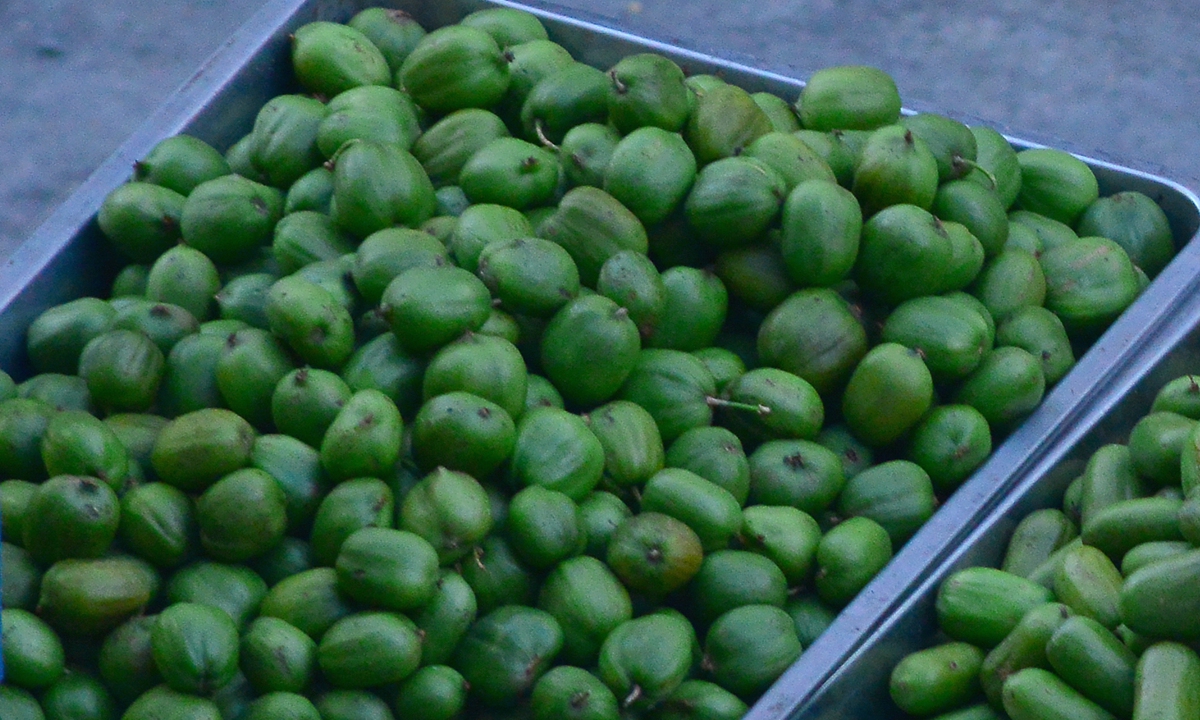
Kiwiberry Photo: VCG
A 324-kilogram shipment of fresh New Zealand kiwiberries arrived at Shanghai's airport recently after an 11-hour flight. It swiftly cleared customs following inspection, making it the first batch of kiwiberry imports into China, according to an online post from the Embassy of China in New Zealand on Sunday.
This came after China and New Zealand signed a new protocol that allows the import of New Zealand kiwiberries during New Zealand Prime Minister Christopher Luxon's trip to China in June 2024. During the visit, the two countries agreed to expand the scope of bilateral trade and investment and deepen personnel exchanges, according to Xinhua.
As China's largest fruit import hub, Shanghai has seen steady growth in fruit imports in recent years. Data from Shanghai Customs showed that in 2024, the city's total imports of fresh and dried fruits and nuts reached 22.24 billion yuan ($3.05 billion), up 9.7 percent year-on-year, China Media Group reported.
Meanwhile, as China continues to open up its market, a growing range of high-quality fruits and other agricultural products from around the world is becoming available to Chinese consumers. This not only expands consumer choices but also allows more countries and regions to benefit from Chinese consumers' rising demand for premium products, a Chinese expert said.
Premium fruits such as durians, cherries and dragon fruit have entered the Chinese market in large volumes in recent years, reflecting the growing demand driven by China's consumer upgrade, Hong Tao, director of the Institute of Business Economics at Beijing Technology and Business University, told the Global Times on Sunday.
In 2024, China imported 1.56 million tons of durians, up 9.4 percent year-on-year, with a total value of nearly $7 billion, up 4 percent, data from the Ministry of Commerce showed.
China is already the world's largest importer and consumer of durians. In 2025, the list of durian-exporting countries to China may expand further, with Laos expected to join the ranks, the International Business Daily reported.
Imported fruits in China are facing growing competition as well. Beyond ensuring quality, exporters must also cater to Chinese consumers' expectations for a seamless experience and high-quality service, Hong said.
China has actively expanded imports, hosting the China International Import Expo for seven consecutive years, steadily advancing unilateral market opening, widening market access and lowering tariffs. These efforts have driven import values to record highs, allowing more countries and businesses to share in the opportunities of China's market and its development gains while promoting a more balanced trade structure, Wang Lingjun, deputy head of China's General Administration of Customs (GAC), said at a press conference in January.
There is still significant room for import growth in 2025. This is not only due to China's vast and diverse market with immense potential, but, more importantly, because of the country's commitment to proactively expanding imports and sharing the opportunities brought by its development with the world, GAC spokesperson Lü Daliang said at the conference.




